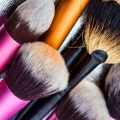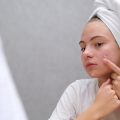1. The Science Behind Sleep and Skin Health After 40
As we enter our 40s, our bodies go through a lot of changes — especially when it comes to skin. One of the biggest factors that impacts how your skin looks and feels is sleep. Quality sleep isnt just about feeling rested; its also essential for maintaining healthy, youthful skin.
Why Sleep Matters More After 40
During sleep, your body enters repair mode. This is when your skin regenerates, collagen is produced, and hormone levels are balanced. However, as you age, these processes slow down. That’s why poor or insufficient sleep in your 40s can lead to more noticeable signs of aging like fine lines, dullness, and sagging skin.
Key Skin Functions That Happen During Sleep
| Skin Function | What Happens During Sleep | Impact in Your 40s |
|---|---|---|
| Cell Regeneration | New skin cells replace old ones | Slows down with age, making recovery slower |
| Collagen Production | Supports firmness and elasticity | Reduced production can lead to wrinkles and sagging |
| Hormonal Balance | Regulates cortisol and melatonin levels | Imbalance can trigger inflammation and breakouts |
The Role of Hormones in Skin Aging
In your 40s, estrogen levels begin to drop, which affects your skins thickness and moisture retention. At the same time, poor sleep can raise cortisol (the stress hormone), which breaks down collagen and leads to puffiness or dullness. Getting deep, restorative sleep helps keep these hormones in check so your skin stays healthier longer.
Tip:
If you’re waking up tired or noticing more skin issues than usual, it might be time to look at your sleep habits. Even small changes in your nightly routine can make a big difference in how your skin looks over time.
2. Common Skin Concerns Related to Poor Sleep
Once you hit your 40s, your skin naturally starts to change—and not always in ways you want. Add poor sleep into the mix, and these changes can become even more noticeable. Getting enough quality rest isnt just good for your energy levels; its also essential for keeping your skin healthy and vibrant.
Dryness and Dehydration
As we age, our skin produces less natural oil, making it easier for moisture to escape overnight. If youre not sleeping well, your body has less time to repair its natural moisture barrier, leading to dry, flaky skin that feels tight or irritated in the morning.
Dullness
Sleep is when your body boosts blood flow to the skin. Without enough rest, circulation slows down, leaving your complexion looking tired and dull. In your 40s, cell turnover also slows naturally, so lack of sleep makes it even harder for fresh, glowing skin to shine through.
Fine Lines and Wrinkles
Your skin makes collagen during deep sleep—a protein that keeps it smooth and firm. Less sleep means less collagen production, which leads to more visible fine lines and wrinkles. Because skin elasticity decreases with age, those lines can become deeper and more permanent over time.
Under-Eye Puffiness and Dark Circles
The delicate skin around your eyes is one of the first places to show signs of poor sleep. In your 40s, puffiness and dark circles can become more prominent as skin thins and loses elasticity. Fluid retention from lying flat at night without enough restorative sleep only makes under-eye bags worse.
Quick Look: How Poor Sleep Affects Your Skin in Your 40s
| Skin Concern | How Sleep Impacts It |
|---|---|
| Dryness | Reduced overnight hydration and barrier repair |
| Dullness | Poor circulation leads to lack of radiance |
| Fine Lines & Wrinkles | Less collagen production during deep sleep |
| Under-Eye Puffiness | Fluid retention worsened by lack of rest |
| Dark Circles | Poor circulation and thinning skin make them more visible |
If youve been noticing any of these issues more frequently in your 40s, it might be time to take a closer look at how much—and how well—youre sleeping each night. Prioritizing good sleep habits can do wonders for both how you feel and how you look.
![]()
3. How Sleep Changes in Your 40s
As you move into your 40s, you might start noticing changes in the way you sleep. Maybe it takes longer to fall asleep, or you wake up more often during the night. These shifts are completely normal and are often due to hormonal changes, increased stress levels, and lifestyle factors that naturally come with this stage of life.
Why Sleep Patterns Shift in Your 40s
Your body’s natural production of melatonin — the hormone that helps regulate sleep — begins to decline as you age. At the same time, stress from work, family responsibilities, or health concerns can make it harder to relax at night. For women, perimenopause and menopause can also bring about hot flashes and night sweats that disrupt restful sleep.
Common Sleep Changes in Your 40s
| Sleep Change | Possible Cause | Impact on Skin |
|---|---|---|
| Trouble falling asleep | Lower melatonin levels, increased stress | Less time for skin repair and regeneration |
| Frequent awakenings | Hormonal fluctuations, anxiety | Interrupted collagen production, dull complexion |
| Lighter sleep stages | Aging brain activity patterns | Reduced overnight hydration and healing |
| Shorter total sleep time | Lifestyle demands, poor sleep hygiene | Puffiness, dark circles, premature aging signs |
How This Affects Your Skins Overnight Repair Process
Your skin does most of its repair work while you sleep — especially during deep sleep stages. When your sleep is disrupted or shortened, your body produces more cortisol (a stress hormone) and less human growth hormone (which supports tissue repair). This imbalance can lead to inflammation, dryness, fine lines, and a tired-looking complexion.
Key Skin Repair Processes During Sleep:
- Collagen Production: Essential for firmness and elasticity; reduced when sleep is insufficient.
- Cell Turnover: Dead skin cells shed and new ones form; poor sleep slows this process.
- Hydration Balance: Skin rehydrates overnight; disrupted sleep leads to moisture loss.
- Cortisol Regulation: High cortisol breaks down collagen and triggers breakouts.
If youre noticing more fine lines or dullness in your 40s, your changing sleep habits could be playing a bigger role than you think.
4. Healthy Sleep Habits for Better Skin
Getting quality sleep in your 40s isnt just about feeling well-rested—it’s also key to keeping your skin looking fresh, smooth, and youthful. As we age, our skin’s ability to repair itself overnight slows down. That’s why adopting healthy sleep habits can make a real difference in how your skin looks and feels. Here are some practical tips you can start using tonight:
Improve Your Sleep Hygiene
Good sleep hygiene means setting up routines and an environment that support restful sleep. This includes things like keeping your bedroom dark and cool, avoiding caffeine late in the day, and winding down before bed with calming activities.
Tips for Better Sleep Hygiene:
| What to Do | Why It Helps Your Skin |
|---|---|
| Keep your bedroom between 60–67°F (15–19°C) | A cooler room helps your body fall asleep faster and supports deeper rest, giving your skin more time to repair. |
| Use blackout curtains or an eye mask | Blocking light boosts melatonin production, which is linked to better skin regeneration during sleep. |
| Avoid heavy meals and alcohol close to bedtime | These can disrupt your sleep cycle, reducing the time your skin has to recover overnight. |
Stick to a Consistent Bedtime
Your body loves routine—and so does your skin. Going to bed and waking up at the same time every day (yes, even on weekends) helps regulate your circadian rhythm. This internal clock controls hormone levels like cortisol and melatonin, both of which affect how your skin repairs itself while you sleep.
How a Regular Sleep Schedule Supports Skin Health:
- Reduces inflammation: Less cortisol production means fewer flare-ups of conditions like acne or rosacea.
- Boosts collagen: More consistent deep sleep promotes collagen production, helping reduce fine lines and wrinkles.
- Evens out skin tone: A stable sleep pattern can help minimize dark circles and dullness.
Limit Screen Time Before Bed
The blue light from phones, tablets, and TVs can interfere with melatonin production, making it harder for you to fall asleep—and harder for your skin to get the rest it needs. Try unplugging at least an hour before bedtime.
Screen-Free Wind-Down Ideas:
- Read a physical book or magazine
- Take a warm bath with calming essential oils like lavender or chamomile
- Practice light stretching or yoga poses designed for relaxation
- Journal or write down three things you’re grateful for
>
By making these small changes to your nightly routine, youre not only setting yourself up for better sleep—you’re also giving your skin the chance to heal, hydrate, and glow naturally as you move through your 40s.
5. Skincare Products That Work While You Sleep
In your 40s, getting quality sleep is more important than ever for healthy, glowing skin. But did you know that what you put on your face before bed can make a big difference too? During the night, your skin goes into repair mode, making it the perfect time to use powerful skincare products that support this natural process.
Why Nighttime Skincare Matters in Your 40s
As we age, our skins ability to renew itself slows down. In your 40s, you may notice more fine lines, dullness, or dryness. The good news is that using the right nighttime products can help boost collagen production, improve hydration, and support cell turnover while you sleep.
Top Nighttime Skincare Ingredients
Here are some of the most effective ingredients to look for in your nighttime routine:
| Ingredient | Benefits |
|---|---|
| Retinol | Boosts collagen production, smooths fine lines, and improves skin texture |
| Peptides | Supports firmness and elasticity by signaling skin to produce more collagen |
| Hyaluronic Acid | Draws moisture into the skin to keep it plump and hydrated overnight |
| Ceramides | Strengthens the skin barrier and locks in moisture |
| Niacinamide (Vitamin B3) | Evens out skin tone and reduces inflammation or redness |
How to Build a Simple Night Routine in Your 40s
You don’t need a dozen steps to get results. A few targeted products can go a long way:
- Cleanser: Start with a gentle cleanser to remove makeup and impurities.
- Toner (optional): Use if you want an extra hydration boost or to prep skin for treatment products.
- Treatment Serum: Choose one with retinol or peptides depending on your main concern.
- Moisturizer: Look for one with hyaluronic acid or ceramides to lock in hydration.
- Eye Cream: Pick one with peptides or caffeine to target puffiness and fine lines.
Pro Tip:
If youre new to retinol, start slow—use it 2-3 times a week at night and gradually increase as your skin builds tolerance. Always follow up with sunscreen in the morning since retinol can make your skin more sensitive to sunlight.
The Bottom Line on Overnight Skincare in Your 40s
Your nighttime routine is a chance to give your skin extra care while it’s naturally repairing itself. By choosing products with proven ingredients like retinol, peptides, and hydrating agents, you’re helping your skin wake up refreshed, smoother, and healthier-looking.
6. When to Seek Professional Help
In your 40s, your skin can become more sensitive to changes in your lifestyle—especially sleep. While some signs of poor sleep are easy to brush off, others may be a signal that it’s time to talk to a professional. Knowing when to reach out for help can make a big difference in both your skin’s health and your overall well-being.
Signs Your Sleep Is Affecting Your Skin
If you’ve been noticing persistent skin concerns despite following a solid skincare routine, poor sleep might be the underlying cause. Here are common skin-related signs that may be linked to sleep issues:
| Skin Concern | Possible Sleep Connection |
|---|---|
| Dark under-eye circles | Lack of quality sleep reduces blood circulation and causes pooling under the eyes |
| Dull complexion | Poor sleep disrupts the skins natural repair cycle |
| More fine lines and wrinkles | Reduced collagen production due to interrupted rest |
| Increased breakouts or irritation | Sleep deprivation raises cortisol levels, triggering inflammation and acne |
When It’s Time to See a Dermatologist
If youve made changes to your sleep habits but your skin still isnt improving, a dermatologist can help pinpoint other contributing factors. Consider booking an appointment if you experience:
- Chronic dryness or flaking that doesn’t respond to moisturizers
- Persistent redness or inflammation
- Sudden onset of adult acne or rosacea-like symptoms
When to Talk to a Sleep Specialist
Your sleep might be doing more harm than good if youre waking up feeling unrefreshed or having trouble falling or staying asleep most nights. A sleep specialist can help identify conditions like insomnia or sleep apnea that may be silently impacting both your health and appearance.
Key Reasons to See a Sleep Specialist:
- You feel tired even after 7–8 hours of sleep
- You snore loudly or gasp during sleep (as reported by a partner)
- You frequently wake up with headaches or dry mouth
The Bottom Line
Your 40s are a time of transition for both your body and your skin. If making healthy lifestyle tweaks isn’t enough, don’t hesitate to seek professional advice. The right support can help restore not just your glow—but your energy too.


